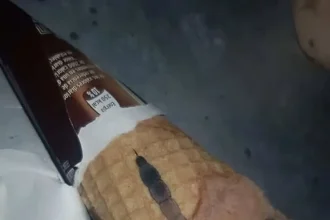It was supposed to be a quiet shift.
Clear skies, empty highway, and just enough boredom to make you wonder what’s waiting around the next mile marker.
Then it happened—a gray sedan flew past me so fast it blurred into the horizon. My radar blinked 150 mph. I hit the siren, radioed in, and went after it.
At first, it looked like a reckless driver trying to outrun a ticket. But the way the car kept jerking between braking and accelerating told a different story. Something was wrong.
The Stop That Changed Everything
When the car finally pulled over, I approached carefully. Inside sat a young woman—mid-thirties maybe—hands trembling on the wheel, eyes wide with panic.
“Do you know how fast you were going?” I asked.
She nodded, breath shallow. “Yes… I—yes.”
Then I noticed it—a dark, shimmering puddle spreading on the floor beneath her. Not oil. Not brake fluid. Something human.
She winced, one hand clutching her belly beneath an oversized hoodie. “My water just broke,” she gasped. “The contractions are three minutes apart.”
In an instant, the ticket book disappeared from my mind. This wasn’t a traffic stop anymore. It was an emergency.
A Highway Turns Into a Delivery Room
I called for backup and an ambulance while helping her move to the passenger seat. “You’re not in trouble,” I told her. “My name’s Officer Carter. We’re going to help you.”
My partner relayed the details—pregnant female, active labor, mile marker 42. We set up a police escort to the nearest hospital, sirens clearing the road ahead.
But halfway there, her breathing changed. It wasn’t panic anymore—it was labor. Real, unstoppable labor.
We pulled onto the shoulder. The sound of cars faded, replaced by the rhythm of her breathing and my calm counting. My partner shielded her from view with a blanket while I talked her through each contraction.
Within minutes, paramedics arrived, taking over with the practiced grace that only experience can bring. Relief flooded through me as they loaded her into the ambulance. She looked up, exhausted but smiling.
“Thank you,” she whispered. “I didn’t know what else to do. My phone broke… I just panicked.”
“You did the right thing,” I said. And I meant it.
The Call That Changed My Perspective
The next morning, my phone rang.
“It’s Lena,” she said softly. “We’re okay. He’s okay.”
“He?”
“Seven pounds, six ounces,” she laughed. “His name’s Miles. Seemed fitting.”
I smiled, staring out at the highway I’d driven a thousand times. That stretch of asphalt looked different now.
What I Learned That Day
People always ask about the job—about the chases, the adrenaline, the danger. But the truth is, most days aren’t like that.
Sometimes, the badge isn’t about writing tickets or making arrests.
Sometimes, it’s about being there when someone needs help the most—even if it starts at 150 miles per hour.
There’s a date circled on my calendar now. Not for a citation, but for a birthday.
Every year when it comes around, I remember the sound of the sirens fading behind an ambulance and a single word etched into my heart: Protect.



